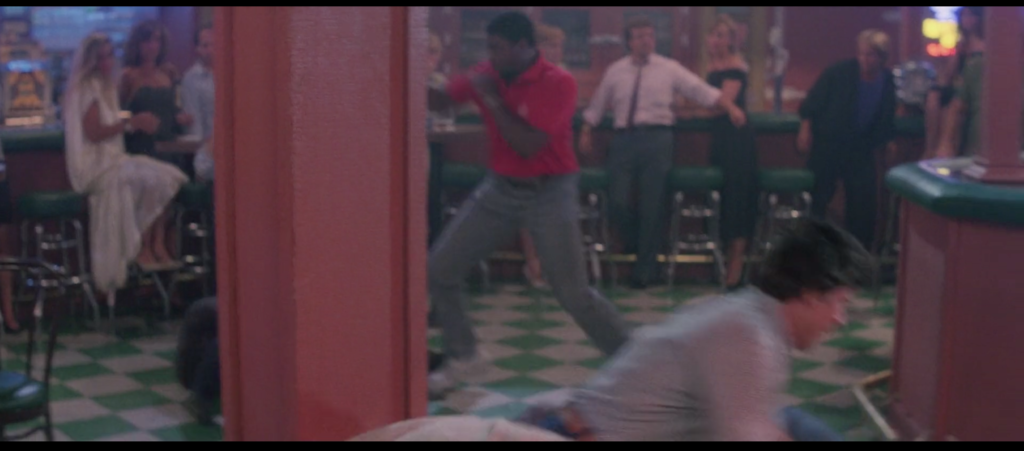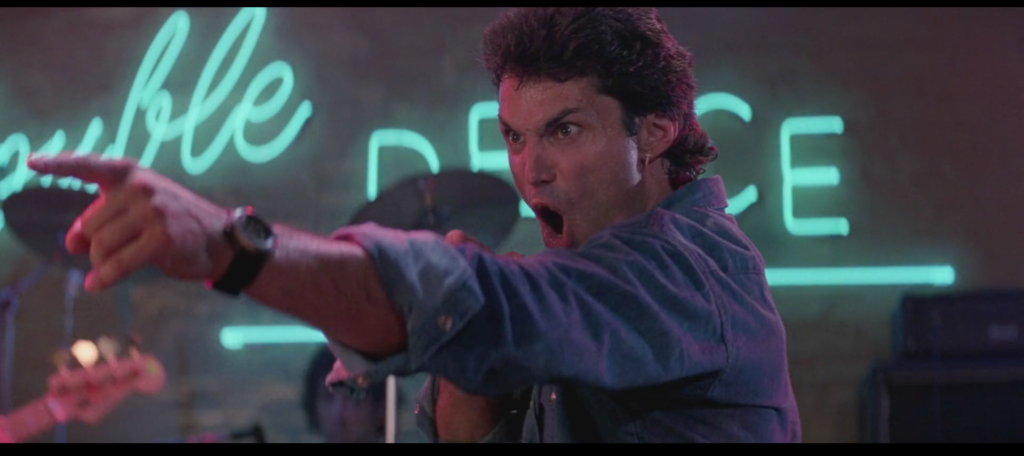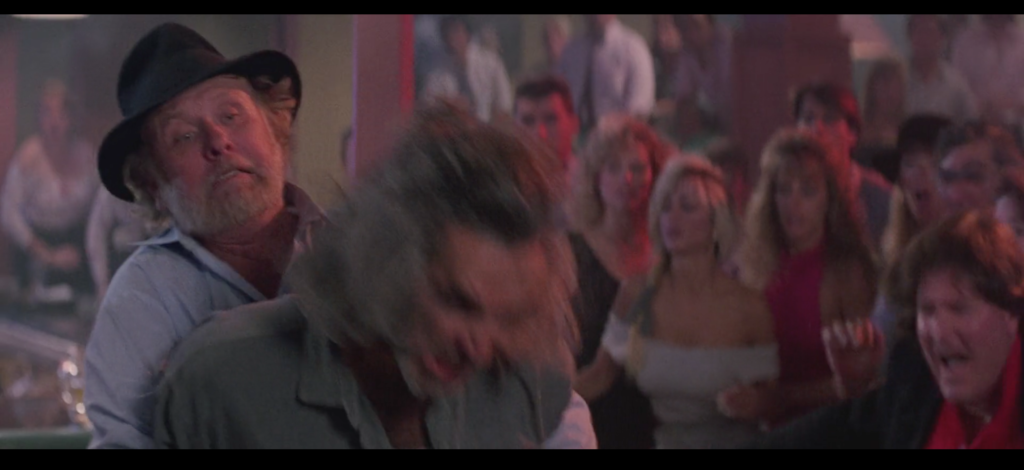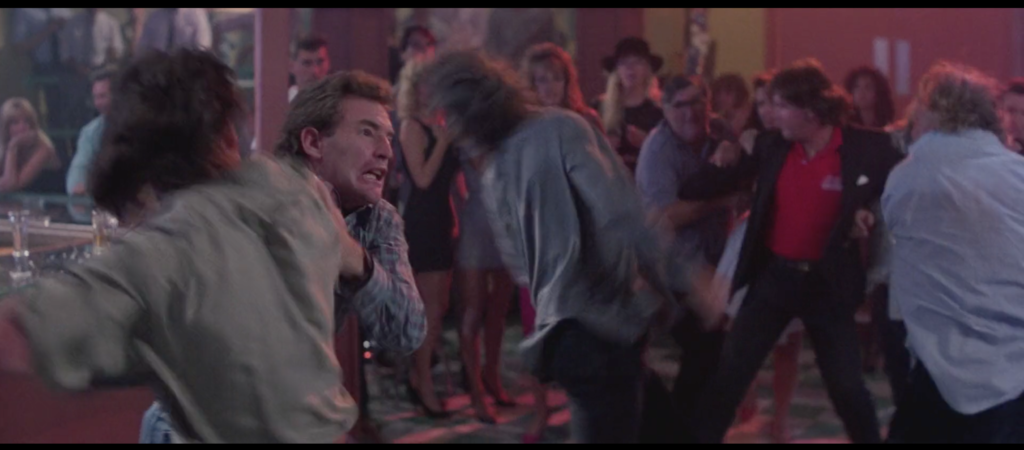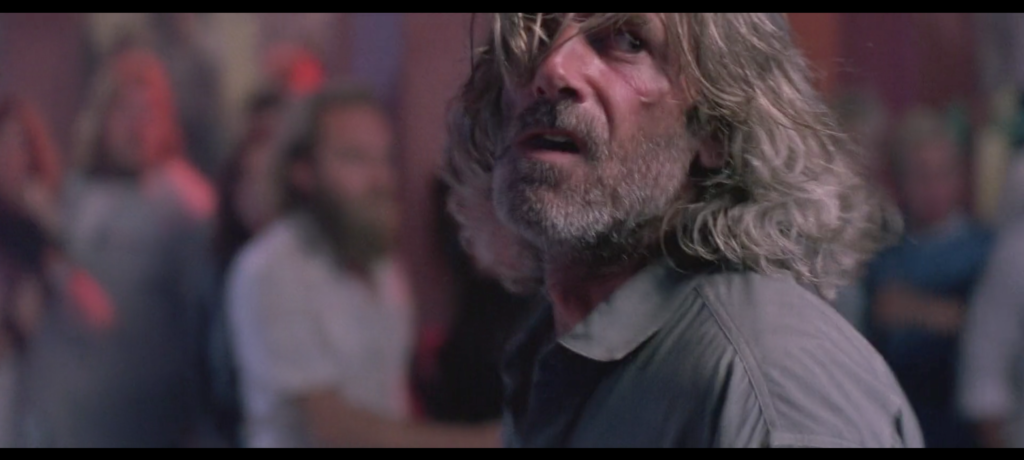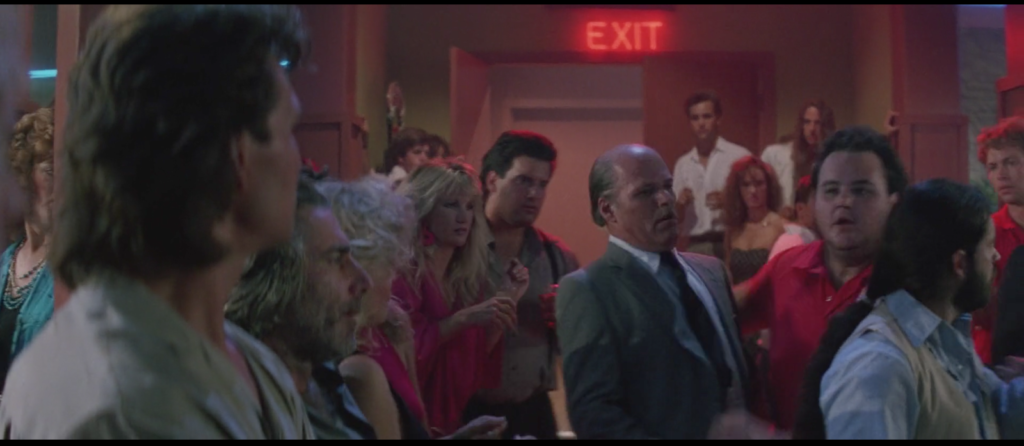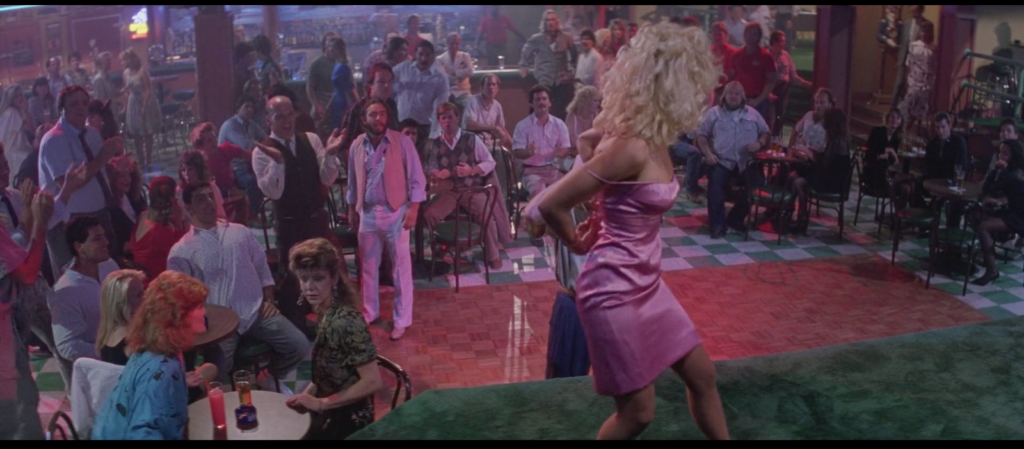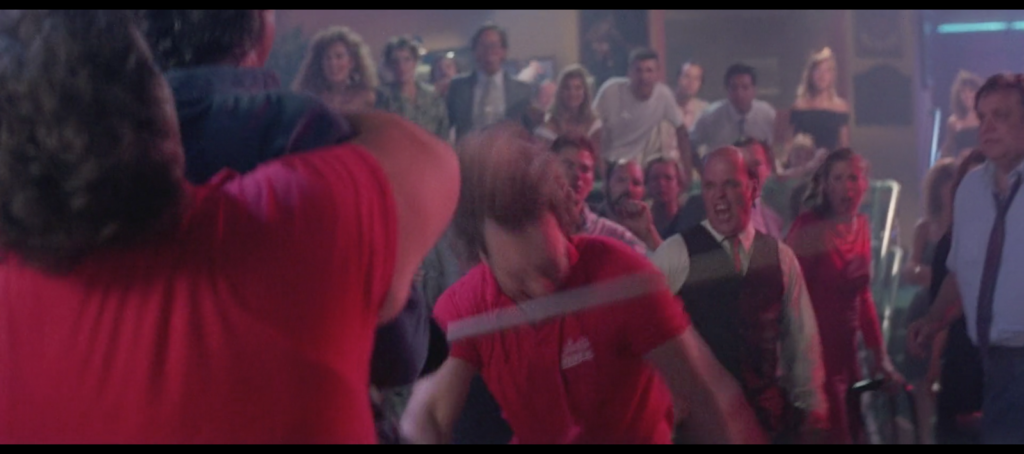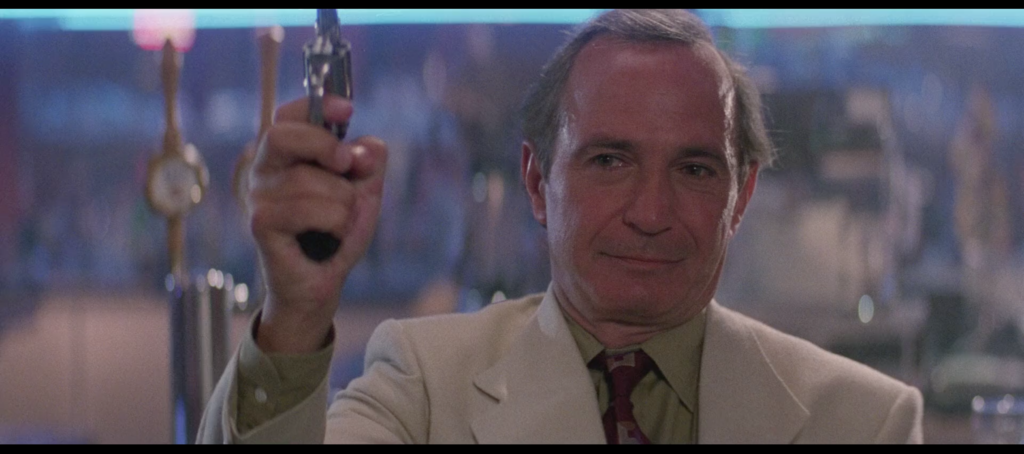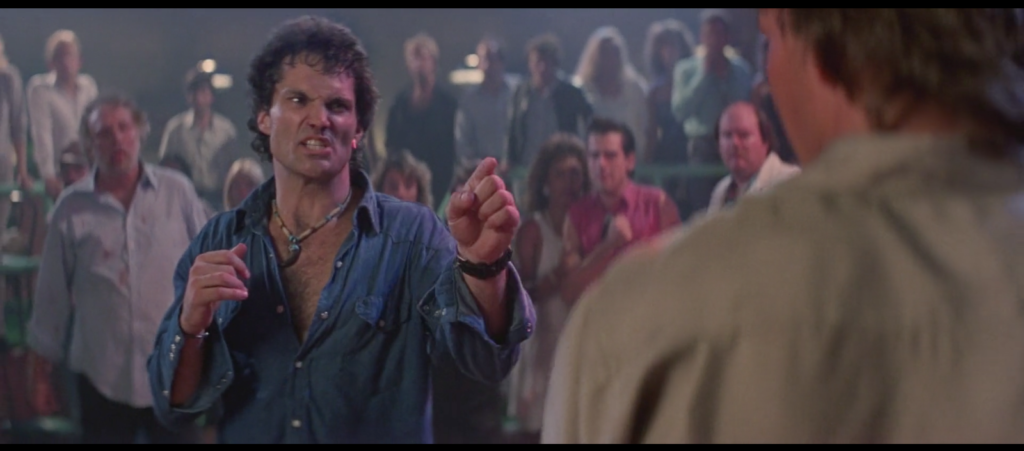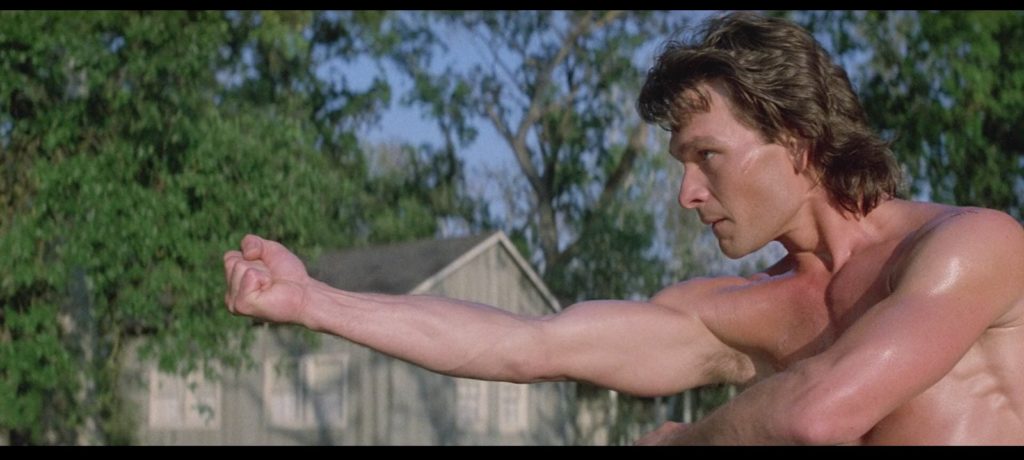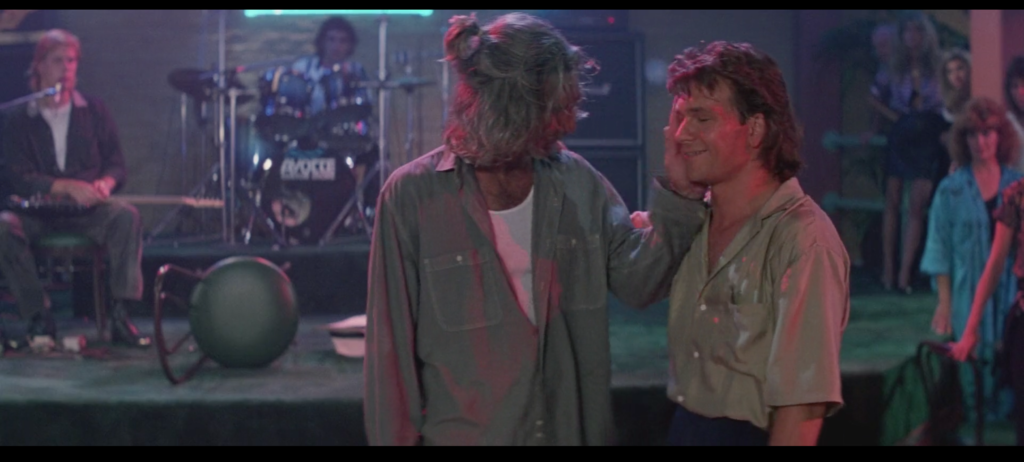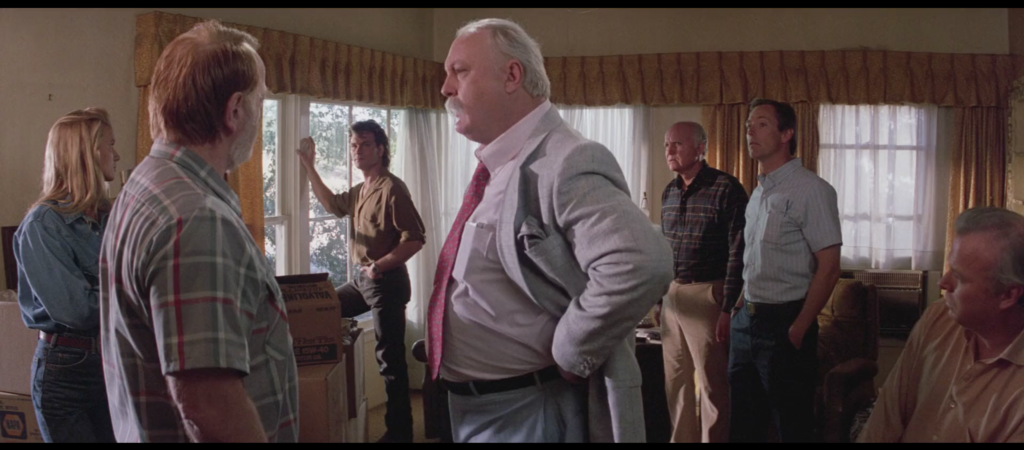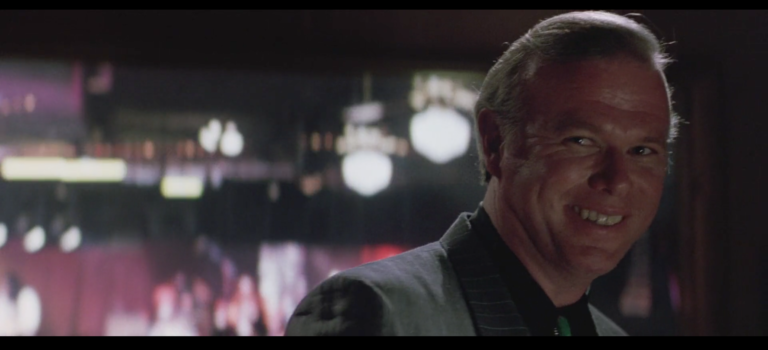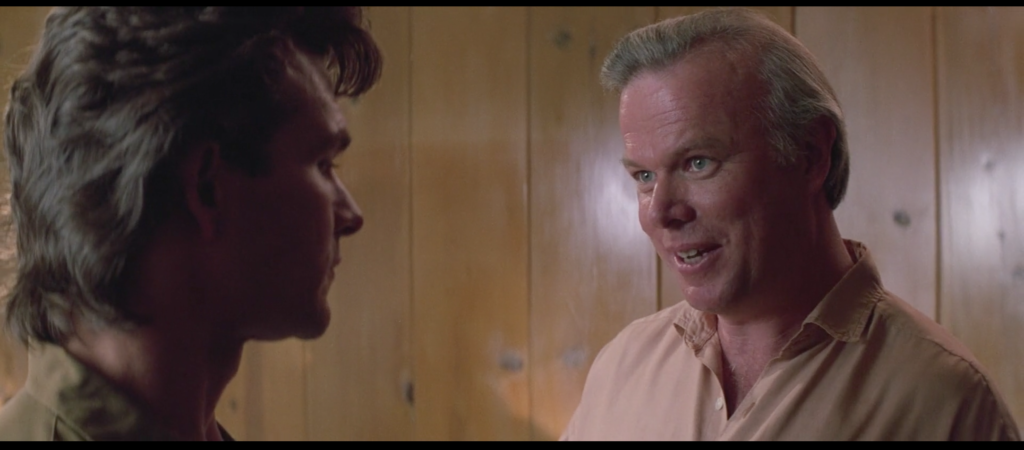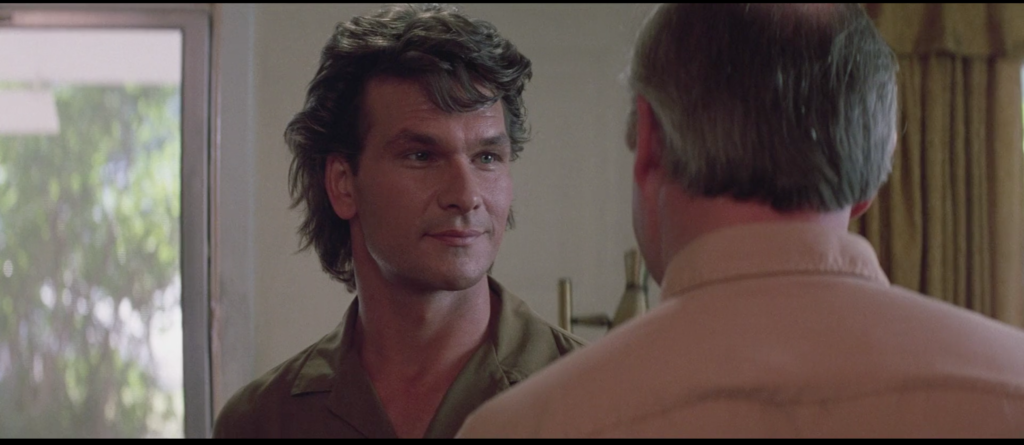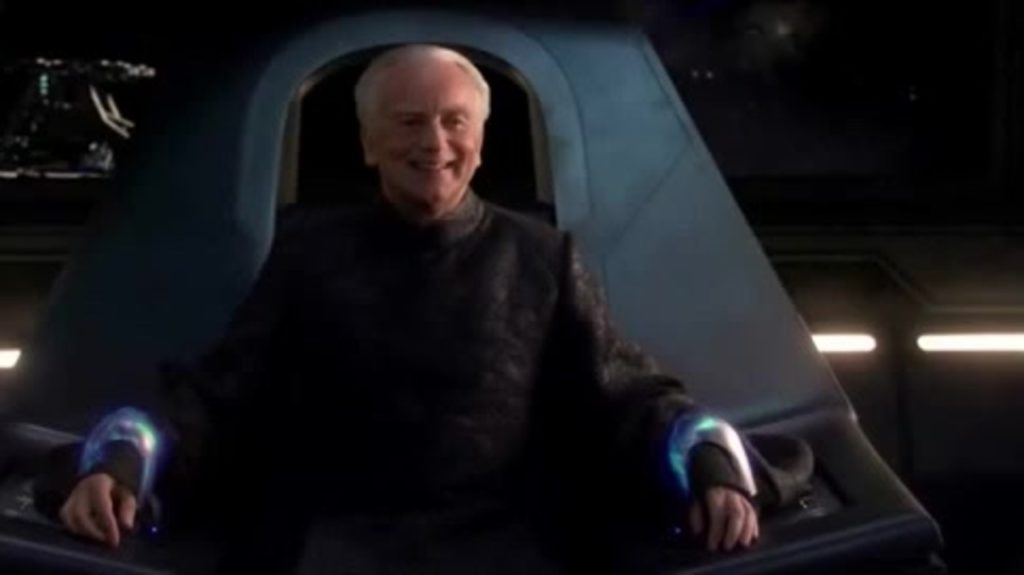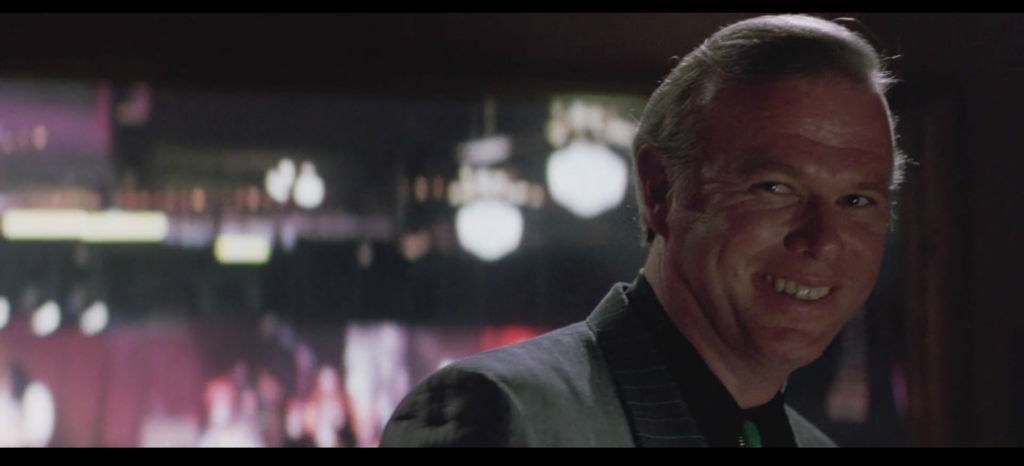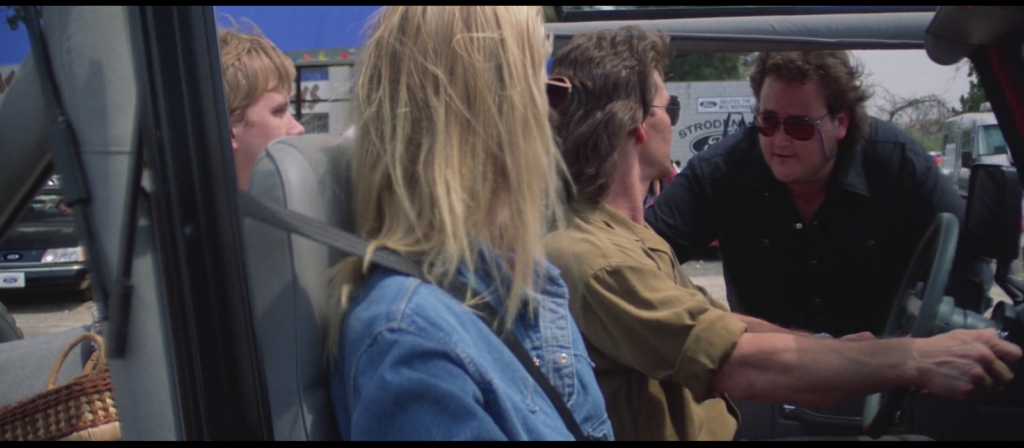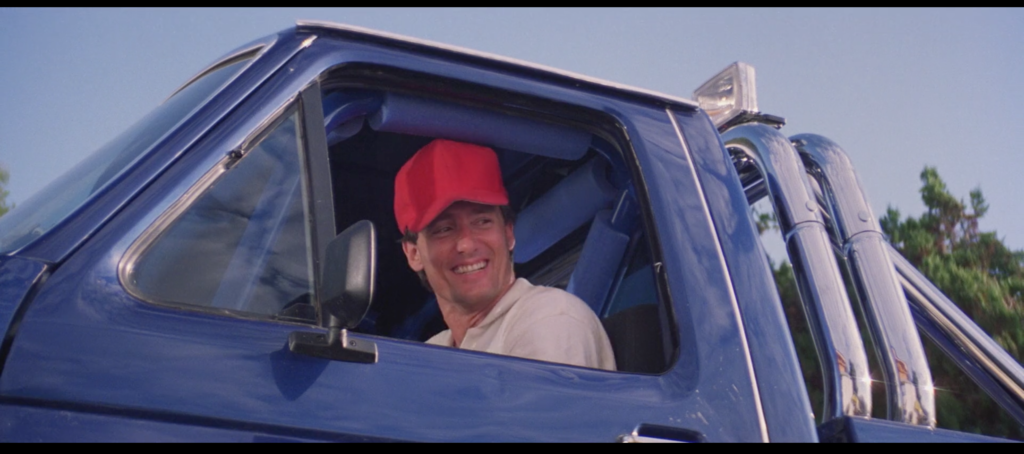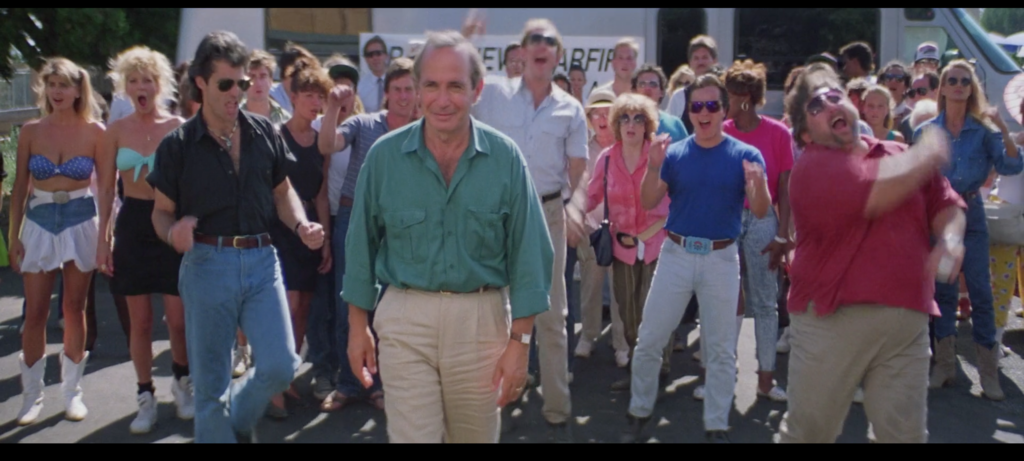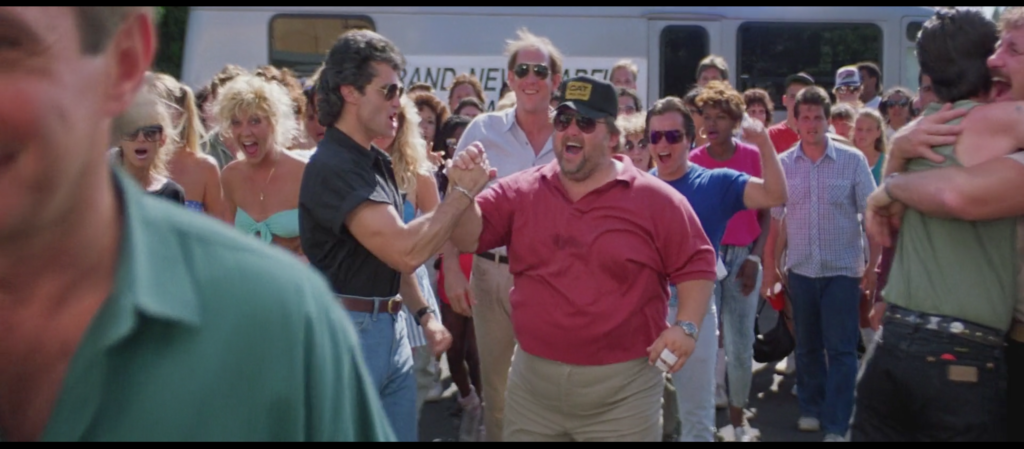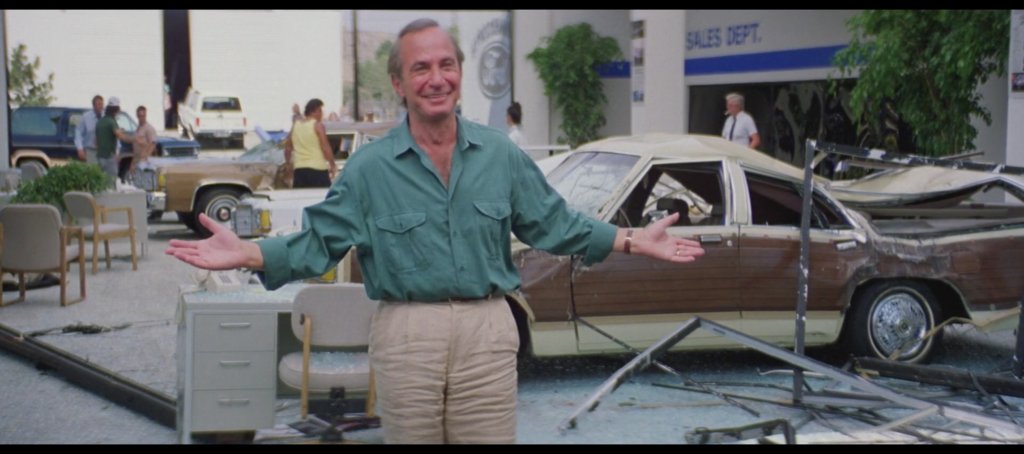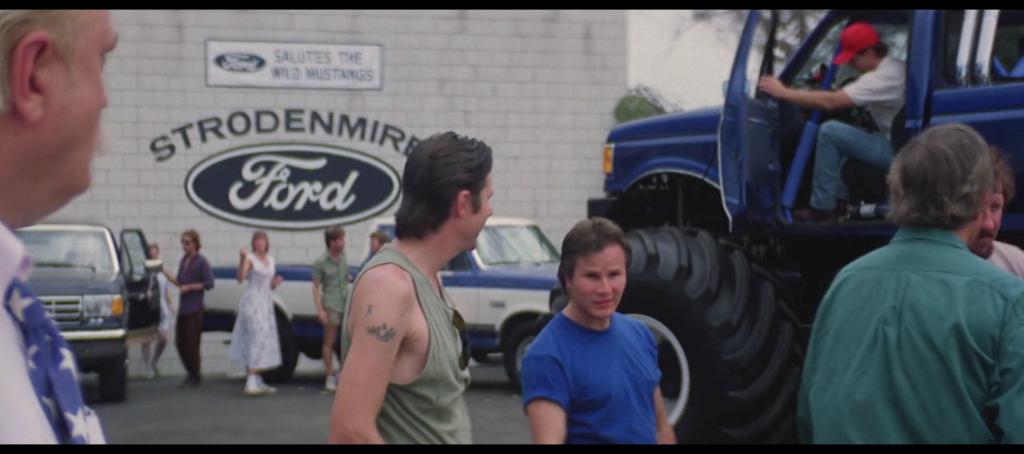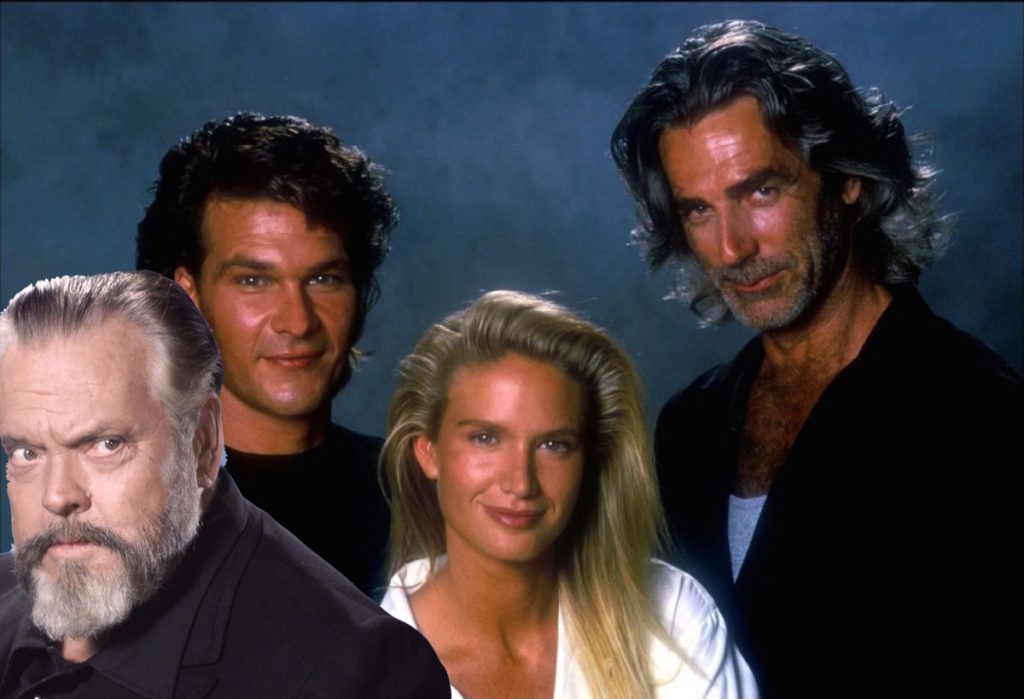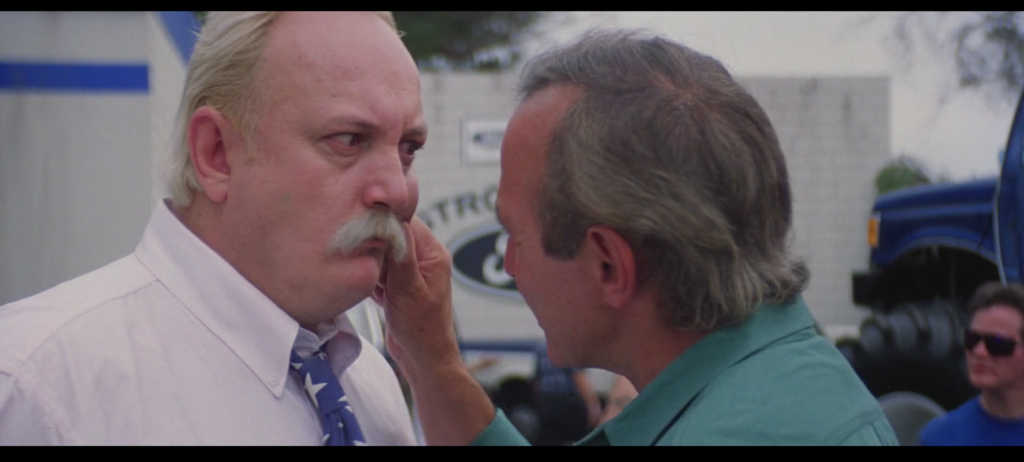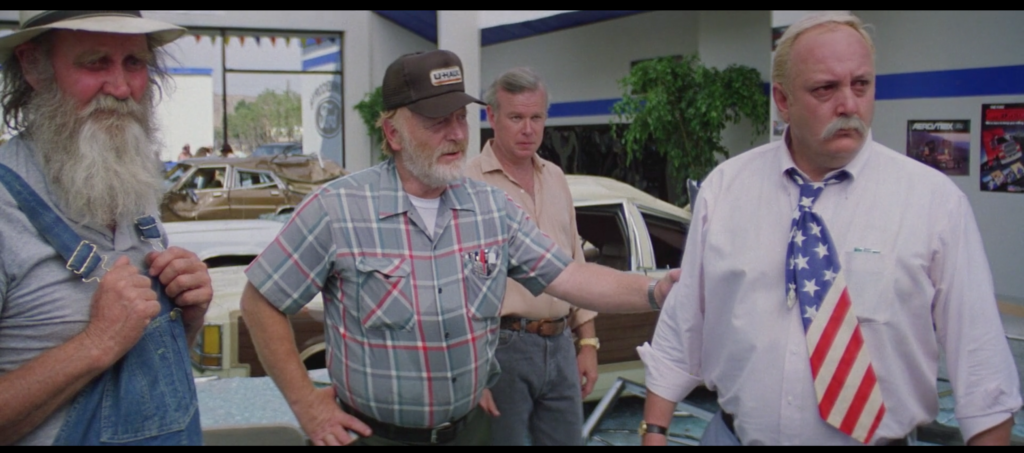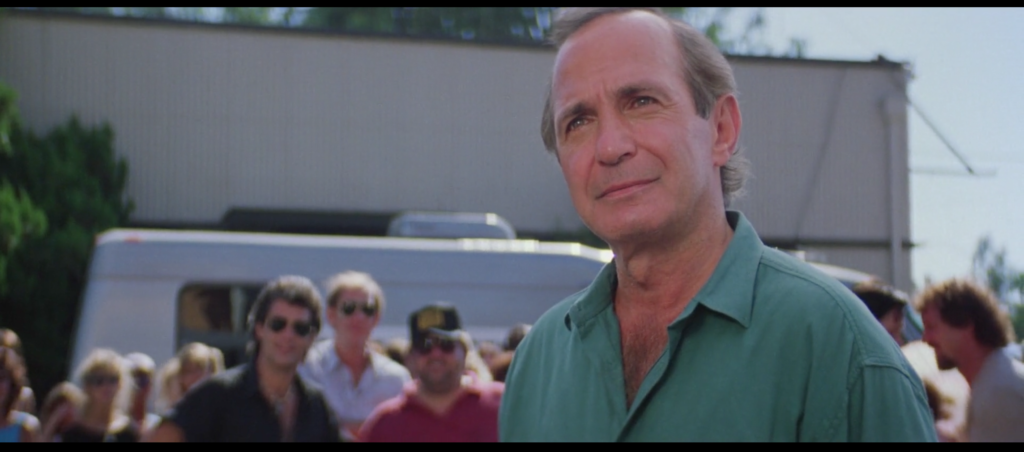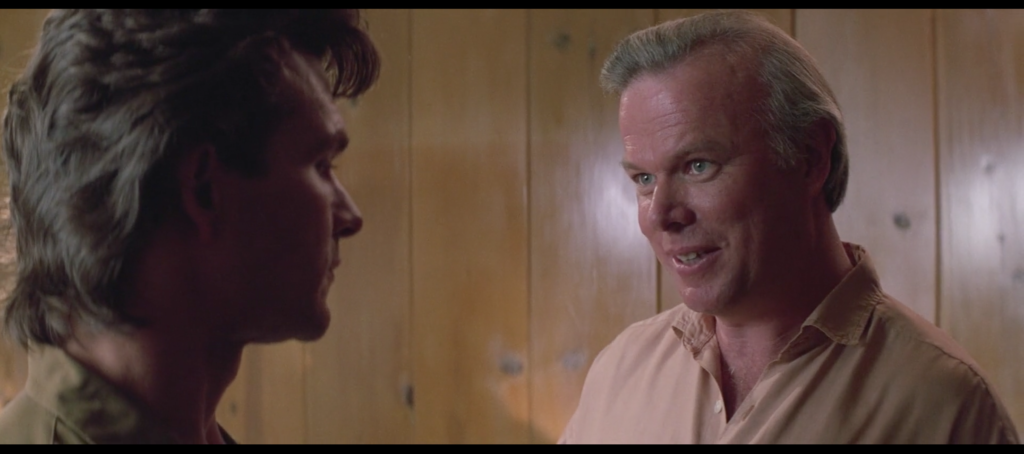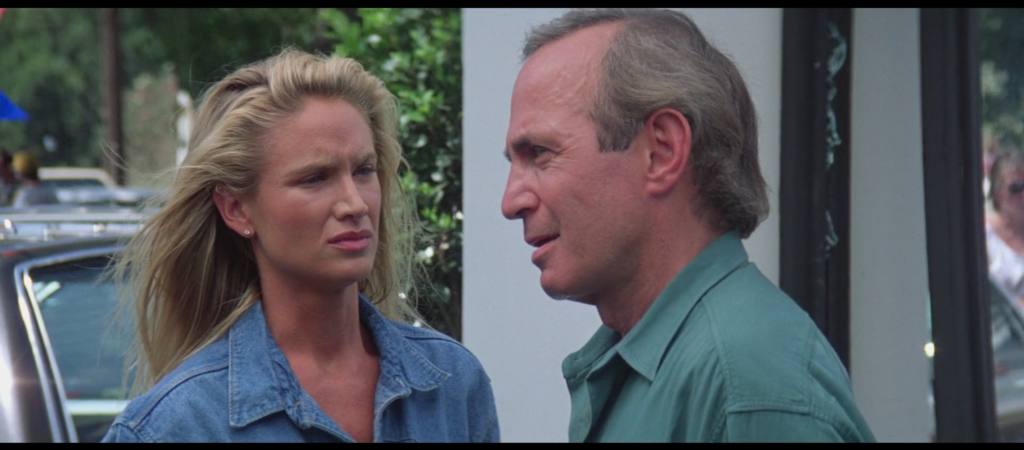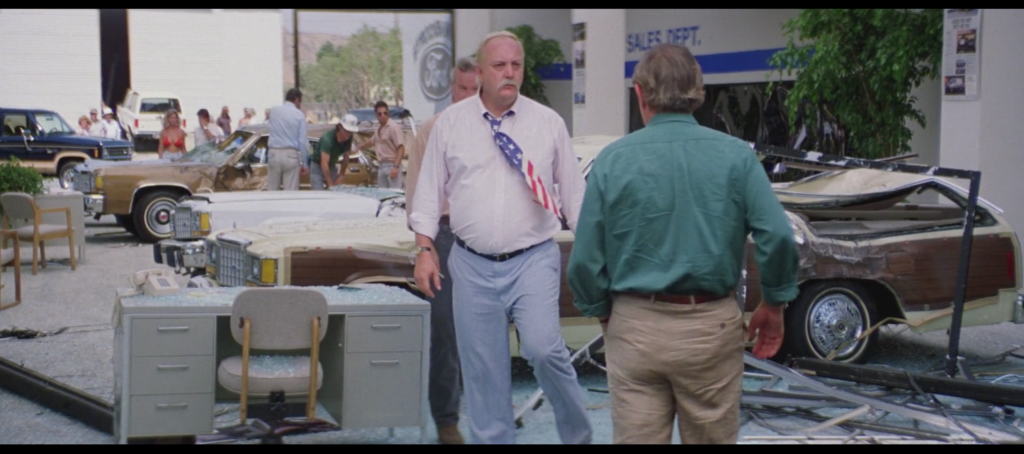Archive for the ‘Pain Don’t Hurt’ Category
257. Ernie inaction -> Ernie in action
September 14, 2019You’re not supposed to see Keith David throw a punch in Road House. His part was all but excised from the film due to running-time concerns. His sole line of dialogue is to warn Tilghman that the whiskey’s running low. He’s one of the great action stars of the ’80s and the most action you see from him is handing Dalton a phone.
But soft! What light from yonder barroom breaks? While Dalton is polishing off one of the many cut-rate Brad Wesley goons—about whom more later—who infiltrated the Double Deuce during Red Webster’s fire alongside the usual suspects, there in the background, his fists obscured by a pillar, is one Ernie Bass, bartender-warrior, throwing hands with some dimp with a mustache and a dress shirt with no tie. Not the most formidable opponent, perhaps, not even in a world that contains O’Connor. But who knows what chaos the butterfly effect could have caused had the character played by Keith David not stepped into that particular breach?
And what about O’Connor and Tinker and Ketcham and Morgan, the traditional goons who accompanied Brad Wesley to the bar on this fateful night? Jack, Hank, and Younger don’t take care of them; they’re all too busy getting smacked in the skull with a pool cue by Jimmy. Wade Garrett doesn’t take care of them; he fights lesser goons until he’s summoned to a one-on-one bout with Jimmy in which he is badly outclassed. (It breaks your heart to see, truly it does.) Dalton doesn’t take care of them; he too is to busy fighting goonlets to do so, and then he intervenes in the Jimmy/Wade fight just before Brad Wesley calls the whole thing off.
There’s every reason to believe that while our attention is elsewhere—as indeed it is even in the few frames where Ernie is visibly fighting, our eyes drawn to the foreground action involving Dalton and a chibi-goon—Ernie wrecks shop, clearing out Wesley’s Slab Four all on his own. Keith David vs. Terry Funk…ah, what might have been. Our imaginations must fill the gap.
258. “YOU!”
September 15, 2019Jimmy Reno wants Wade Garrett. (Yes, his last name is Reno, as mentioned by Patrick Swayze in interview clips and as listed all over actor Marshall Teague’s CV. Yes, this could mean he is an illegitimate child of Brad Wesley born in Nevada, and Reno is his bastard name. No, I will not be taking further questions at this time.) Boy, does he ever. Enough to pole vault over Jack’s prone body onto the stage, just to be better seen and heard by his quarry. Once Wade responds, Jimmy jumps right back down again. He wanted to make a show of this. He wanted to ensure that Wade Garrett could not back out of this confrontation without losing face. He wanted the entire Double Deuce to watch him prepare to end a legend.
And Wade Garrett knows it, that’s the real asskicker. He and Dalton are off their game tonight, perhaps because of the traumatic destruction of a nearby business that’s still burning as this fight takes place, in front of the man who ordered the arson. The whole Double Deuce team is off its game, perhaps, otherwise the numbers would have worked in Jack and Hank and Younger’s favor. Instead, they’ve been laid out all over the dance floor while Wade and Dalton tussle with lesser goons we’ve never seen before nor will ever see again.
(Yes, one of them is wearing a large black hat. Yes, so is a woman visible in the background. Yes, I continue to be perplexed by the presence of all those hats. Again, I will not be taking further questions at this time.)
This is the moment Jimmy chooses to call out Wade Garrett. He vaults onto the stage. He turns. He points with the force of a kung fu strike. He bellows a single word, a single syllable: “YOU!” And Wade Garrett knows the time to be tested has come.
259. The Suit
September 16, 2019At this late stage of the film, in this Time to Not Be Nice, great extras and background actors are largely a thing of the past. Wasn’t that Dalton’s entire raison d’être—to expunge the 40-year-old adolescents, felons, power drinkers, and trustees of modern chemistry—the Shirtless Man, the Foxworthy, the Mr. Clean, the Well-Endowed Wife? Other than their shared penchant for ostentatious hats the patrons of the new Double Deuce are a nondescript sort.
So it’s truly something special that the Suit stands out. That’s him getting shoved out of the way by Jack when the fire at Red’s break out, reacting with a stunned fervor usually reserved for members of the high school drama club who don’t get a speaking role but are pretty distracting in crowd scenes. That’s him again—sans jacket, now in a different color shirt and a vest—hooting and hollering at Denise’s dance like a man who’s never seen tits before, or at the very least has spent a long time in some sort of monastic community not of his own free will. And that’s him a third time, baying for blood as Jimmy whips the shit out of all comers.
A distinctive look. A face that’s expressive to the point of overdoing it, like a commedia dell’arte mask. The bald, browed pate of an angry Ugnaught. A three-piece suit at the white blues bar. The Suit, most extra of extras and last of a dying breed, has it all.
260. “This isn’t working out, Dalton”
September 17, 2019Brad Wesley has had enough, though it’s unclear of what. Denise’s dance? He ordered it. The barfight? He started it. Jimmy’s faceoff with an outmatched Wade Garrett and an untested Dalton? He instigated it. Everything happening in the Double Deuce right now—even the bit where the whole place ran out to watch Red Webster’s store explode—is Brad Wesley’s design. So why fire a gun in the air and call everything off?
When all you have is a hammer, every problem looks like a nail. Brad Wesley has two things: a colossal ego, and a gun. Not even he can shoot a man or two men to death in front of a bar full of witnesses, but still, the possession of the gun necessitates its use. That’s when the colossal ego comes in. Brad Wesley made the nights events happen, and he must show that he can unmake them as well.
What’s more, he must exert ownership over all of the involved parties. Think of how he told Denise to dance: “Of course you can dance, honey,” as if she’d asked his permission. It was noblesse oblige even to phrase it that way—he was commanding her, not responding to an audible request after all—but it still put him in the driver’s seat. So too did rolling with Dalton’s pet metaphor and summoning forth Jimmy, his top dog.
And so does his statement, after firing the gun to stop everyone in their tracks and saying “that’s enough”: “This isn’t working out, Dalton.” As if Dalton had asked. As if he and Dalton had entered into some agreement his end of which Dalton was no longer holding up. As if all events in Jasper, in every home and every place of business, must be run past Brad Wesley.
In that sense, this really isn’t working out, as Brad Wesley will learn to his sorrow, but not before sorrow is meted out in kind.
261. “Your ass is mine, boy”
September 18, 2019There’s a thin line between threat and come-on, and Road House spends its final reels dancing all over it. When Dalton steps in to stop Jimmy’s trouncing of Wade Garrett (and we love Wade, we love Wade Garrett, but this is a piss poor showing on the sensei’s part), he naturally makes a mortal enemy of his opposite number. Jimmy’s relationship with Dalton heretofore has been one of long, meaningful stares, without so much as a word exchanged. But the relationship has escalated, and a statement is called for. It’s almost an overture for the opera to follow, featuring all the major melodies: smug superiority, possessiveness, infantilization, a reference to Dalton’s ass. Jimmy and his biological father Brad Wesley (that’s my statement, no further questions) will return to these refrains over and over as the duel for Jasper heads toward its bloody conclusion. After much toil and tribulation, we will finally learn whose ass is whose.
262. Parallels
September 19, 2019It’s not often that you encounter two shots of two diametrically opposed characters doing basically the same thing but in such different ways that you can understand everything there is to know about them both at a glance. It’s not often that you encounter a movie like Road House either, though. And here we have two future combatants in a life or death struggle, one arm pulled back, the other extended. The first is poised but serene, making a fist but with no intention to use it, shirtless, glistening, one with nature, wet with nature. The second is enraged, pointing at an enemy, singling him out, hungry for a kill, blocking out the blue light of the happy societal microcosm in which he is an interloper. Dalton and Jimmy, two sides of the same coin, the Batman and Joker of the JC Penney.
263. “Same town, new story, huh, pal?”
September 20, 2019Wade Garrett may have taken a few too many shots to the head at this point, because I swear the thing he says to Dalton as Brad Wesley, Jimmy, and the rest of the gang saunter away makes no sense. “Same town, new story, huh, pal?” he asks, which…I’m sorry, what? Surely he means “New town, same story,” insofar as Dalton and Wade both talk non-stop about how they’ve seen it all before during their lives on the road. Unless he means that their fun time gallivanting with the Doc was one story and now this whole explosion/striptease/barfight scene is a different story entirely. And the beers Wade proposes at the end of this scene—are they a third story? Or would they be a continuation of the first story, the gallivanting-with-Doc story, given how integral beers were to that story? Or is it a continuation of the second story, the explosion/striptease/barfight story, since it takes place in the same location? Or did Sam Elliott flub this line and director Rowdy Herrington liked the sound of it so he kept it intact, like how in “Pass the Mic” Mike D rhymed “commercial” with “commercial” instead of “rehearsal” but it actually made the point he was making (“Everybody rapping like it’s a commercial / acting like life is a big commercial”) better if he delivered it incorrectly?
264. The Council of Elders
September 21, 2019The destruction of Red Webster’s Auto Parts by the coward Brad Wesley triggers alarm bells for the Jasper Chamber of Commerce, or whoever the assembled worthies in the scene that follows the morning after the bar fight are supposed to be. Red and Tilghman, sure, they’d be there. Dalton, why not, he’s obviously the focal point for Brad Wesley’s anger. Doc is Red’s niece, and as the ostensible purpose of the meeting is to persuade him not to pack up and run away from town it makes sense she’d be there. These other fellows? At this point it’s anybody’s guess. So let me be the first to assure you that you will never see the two gentlemen in the background ever again. Who are they? What do they think? Are they Fotomat and 7-Eleven franchisees who got into bed with Brad Wesley and are now feeling buyer’s remorse? Does maybe one of them own the boat store that forms the third point of the Double Deuce/Red’s Auto triangle? Why isn’t Emmett here? What about Big T of Big T Auto Sales, or the crusty guy who sells Dalton spare tires, or the crusty guy who runs one of the several greasy spoons Dalton visits, or anyone we’ve ever seen before? We will never know. Accept the mystery.
But the mustachioed fellow in the ill-fitting gray suit in the center? Ah, so you’ve met Pete Strodenmire. We are currently one hour and twenty-four minutes into the film, with half an hour to go; what better time to introduce a major new character—as well as the fourth and final Car Salesman of Jasper, Missouri—who will go on to participate in the killing of the film’s antagonist? He does little of equivalent efficacy here. He just asks Red if he has insurance and offers to contact a friend in the FBI in Springfield about the arson in order to work around Wesley’s control of the local constabulary. Red truly does not want to hear about either proposal. So in its way this film is setting up our next encounter with Pete just a few minutes hence, when he proves as unable to stop a monster truck from running over his car dealership as he is to talk Red off the ledge here.
One final note here: Can you guess which august personage here assembled wants to continue the fight?
Now why on earth would that be? We wonders, precious, we wonders.
265. Fear itself
September 22, 2019Frank Tilghman is having scotch on the rocks at the “village worthies meet at Red Webster’s house as he packs up to move following the destruction of his place of business and the subsequent barfight instigated by the arsonist” function, as a totally normal innocent normal man could be expected to do. But he has more to offer than the jolly sound of ice tinkling in his glass. “You scared him last night,” he says to Dalton regarding Brad Wesley, who we’ve just learned from Red Webster has the police department in his pocket, hence the lack of official inquiries when people are beaten half to death in front of hundreds of other people. “Brad Wesley, he’s not afraid of anything, right?” he asks rhetorically. “Well, last night, that son of a bitch was afraid.”
“No he wasn’t,” Dalton retorts, smiling. Normal conversation with normal reactions all around.
Dalton is right, of course. Brad Wesley oozed confidence out of every pore in the Double Deuce the night before. He had his girlfriend or kept woman or whatever poor Denise is strip to prove his prowess. He then ordered his boy Jimmy to fight the bouncers and Wade Garrett for the same reason. Finally, he fired a gun to call the fight off, showing that the action starts and stops on his say-so. He really could not have been more empowered, and more sure of his empowerment, even before we get to the whole “getting away with arson” thing. Christ (as Wesley would say), he went to the Double Deuce for the express purpose of rubbing his role in the arson in everyone’s face!
So once again we must wonder, what’s Tilghman’s angle here? Why is he having a drink? Why is he smiling? Why is he touting a nonexistent weakness in Brad Wesley’s armor to the man he wants to attack that nonexistent weakness? Why would he instigate further hostilities given the tremendous cost incurred by everyone involved other than himself?
266. Head On Down to Wagon Days
September 23, 2019“Dalton, you gotta check this out,” Jack says. “Looks like Wesley wants to put a little something down on a new car.” This is his tipoff to his boss that Brad Wesley plans to take a monster truck and destroy a car dealership with it. Why he chose to deliver this information in a wisecrack is the viewer’s to decide. Spider-Man, I’m thinking—Jack reads Spider-Man comics, hence the resort to jokes during tense moments. Do I get a No-Prize?
But Jack and his banter and his weirdly small boots with his stonewashed denim tucked into them is beside the point. Mostly I want to call attention to the assemblage of humanity present for the impromptu monster truck rally. Jack is there, and so are his Double Deuce coworkers Carrie Ann and Frank Tilghman. Red Webster is there too—guess he didn’t skip town after all—along with Emmett, who has finally taken his place in the Council of Elders I suppose. Brad Wesley has brought along virtually his entire goon crew, though that’s to be expected when you’re planning to destroy a place of business in broad daylight.
And here in their car are Dr. Elizabeth Clay, Dalton, and Cody from the Jeff Healey Band. What was their plan for the afternoon? What did that conversation sound like? “Hey Cody, it’s Dalton. Look, me and the Doc were gonna swing by Wagon Days at Strodenmire Ford after lunch sometime. Wanna come with?” “Sure thing, man, just gotta drain the main vein first.” “Okay, well, as I said we won’t be heading over till like one or two, so you should have plenty of—hello? Hello?”
267. Gary
September 24, 2019You’ve heard me complain about Ketcham, Brad Wesley’s most anonymous goon. How he’s handsome in a generic, Ken-doll way. How he’s a shirt-tucked-into-jeans kind of guy. How he doesn’t get a memorable introduction, just kind of sidling along in the background during the Bleeder scene. How no one ever bothers saying his credited name “Ketcham” out loud. How he pales in comparsion to Morgan, O’Connor, Jimmy, Pat McGurn, even Tinker, but how he’s the final guardian of Brad Wesley and the killer of Wade Garrett. How despite wielding the boot-knife and driving the monster truck you could walk right past him without even realizing who he was. How he’s aggressively, almost confrontationally non-descript.
Imagine how I feel now that I realize his name is “Gary.”
“Well, what are you waitin’ for, Gary? Drive through there!” That’s what Brad Wesley yells just before this tool in his giant red baseball cap runs over Strodenmire Ford with his monster truck. He says it with his back turned and with no eyeline-match cut, which is why I’ve watched this movie several dozen times and never noticed it before, but yeah, that’s Ketcham’s first name, Gary. Gary Ketcham. Gary, that most vanilla of names. If beige were a name rather than a color, it would be Gary. Gary is the “pic of myself wearing Oakleys in the driver’s seat of my car as a twitter avatar” of names. Gary. Wade Garrett gets killed by a guy named Gary. You remember Gary, don’t you? Wait, who are we talking about again?
268. Happiness Is a Squashed Ford
September 25, 2019Gary grins from ear to ear. Jimmy does a double fist-pump. O’Connor raises an arm aloft in triumph. Tinker yee-haws his hat off his head. Pat McGurn and Morgan? They literally embrace. (Jimmy and Tinker merely clasp hands.) The Goon in Blue (about whom more later) is just happy to be there. And Brad Wesley acts like a game show host. Truly, the destruction of Strodenmire Ford by the coward Gary Ketcham is the high-water mark of villainous delight for the Brad Wesley organization. For once in their miserable lives they managed to get one over on their enemies in a way that did not require any of them to get their asses kicked. They didn’t even need to throw a punch, much less take one. They just had to get behind the wheel of a monster truck—one of them did, anyway—and drive on through to the other side. The rest take a joy in this of the sort you see in bars when the home team wins the Super Bowl. They are thrilled, inordinately thrilled, “the director overdid it” thrilled, to have watched a monster truck run over a car dealership. Did I point out that Morgan and Pat, the two orneriest cusses in the whole gang, hug each other, like one just announced his wife is expecting? This is the rough beast they gave birth to instead, haulin’ ass towards Bethlehem to put a little something down on a new car.
269. In Search of the Lost Goon
September 26, 2019Some men have a face that says “I can and will kick your ass, and I will be weird doing it.” In the ’80s and ’90s these men often found work as memorable goons in Hollywood action films, playing the heavy’s henchman, a mutant in leather bondage gear, someone who gets dispatched with a one-liner, you know the deal. In the case of Road House, one wore a sporty blue t-shirt and didn’t do much of anything.
The man you’re looking at here is Benny Urquidez, martial artist, stuntman, and fight trainer. He worked closely with Patrick Swayze and Marshall Teague to help choreograph the legitimately phenomenal fight scene between Dalton and Jimmy that will take place later in the film. Even though he’s just kind of in the background here, milling around with all the other goons as Brad Wesley prepares to order the destruction of a Ford dealership, he stands out. You know how I’ve gone on about how to be a good goon, you need to get introduced with a memorable shot or while performing a memorable action? Benny’s nameless goon whips off his sunglasses like a @dril character, revealing a distinctive beady-eyed visage beneath. He’s hard to miss, so hard in fact that the first few times I saw the movie my mind just filled in the blanks and conjured him into fight scenes in which he was not present at all.
Because that’s the thing: He’s not present in any fight scenes. He’s not present in any scenes period, except for this one. In a way he’s the heir to Karpis: He makes an impression and then <poof> he’s gone. Only unlike that dashingly handsome mystery man and possible Cousin in Memphis, his legacy lives on in the titanic struggle between an itinerant bouncer-philosopher and the chief enforcer of a guy who has his own reserved parking space at the mall. It is through Dalton and Jimmy that the Lost Goon may be observed, ripping throats from another plane.
270. Orson Welles for “Road House”
September 27, 2019[inaudible] again please. We know of a little town called Jasper, in Missouri, where Emmett lives. Emmett who. Who is— […] What is the first name of this man Emmett. […] “Emmett” is his first name? What is his surname? […] Surname. Last name. Honestly, this is exhausting, my having to explain this to you. […] He has no last name. It’s just “Emmett,” is it? […] Well then how do you know which name it is? […] Yes it is. Yes it is important. How am I to describe the film amid such uncertainty? […] Then whose job is it, if not mine? I know my job, sir. I know precisely what my job is and isn’t, more than I can say for you. And your friend. […] If you want me to say “Emmett” I will say “Emmett,” I simply wish to be on record as stating it makes no sense. I’ve no wish to be held responsible you see. […] Fine. Fine. Are we ready? […] Exhausting. […] We know of a little town called Jasper, in Missouri—now you’ve done it again. You’ve added an “in” where no “in” need be. […] Jasper, Missouri. That’s— […] That’s—it’s more pleasing to the human ear to say Jasper, Missouri than it is to say Jasper, in Missouri. […] The English language. Do you say New York, in New York? […] We know of a little town called Jasper, Missouri, where Emmett lives. Emmett raises horses…raises horses. No, […] No, something does not— […] The sound of it. Raises horses. Too sibilant. The phrase sounds like the buzzing of bees. […] Well if you won’t change it then at least tell me you hear it. Indulge me if you would, please. […] Thank you. How very kind. […] Emmett raises horses on his little ranch, just across the water from—you know you will confuse people. […] The water, as if you expect them to know which or what water. Emmett raises horses—and I’m only proceeding under duress you understand. Miserable. […] Emmett raises horses on his little ranch, just across the water from this man. His name: Brad my God. […] You want me to launch right into his name right after saying the words His name. But you see if you massage it a bit— […] If you add a goddamned verb and massage it a bit it sounds much cleaner. His name is Brad Wesley. […] But I’m looking at the copy and […] Put down that ridiculous mug and pay attention! You want the emphasis to be on the sentence that follows: He is the most dangerous man in town. But you cannot emphasize that sentence as it’s written right now because you’re emphasizing his name. […] It’s before we are told what distinguishes him that’s the problem. […] Why are we leaping ahead all of a sudden? […] Well that is bullshit, I’m sorry, because I said it in passing. If you want me to read it and do what you’re paying me for then do me the kindness of allowing me to do a read of it. […] His name is Brad Wesley. He is the most dangerous man in town. Are you sure? […] Because […] No no, because it doesn’t match up with the footage at all. He is the most dangerous man in town and you have him eating breakfast. The least dangerous man in town no doubt eats breakfast as well. One should hope. […] So you see it does not distinguish him. […] Yes, I’ll wait. This day is beyond salvage whatever the case. […] [unintelligible] bit prosaic to show him with a gun when you’re saying he’s the most dangerous man in town. Prosaic and redundant. […] The picture and the words together tell the story and you have them speaking in unison as it were. From which school were you matriculated? […] Where did you go to school, to university. […] [prolonged exhalation] […] See, that’s it! Now you’re using your head, for arguably the first time today if you’ll pardon my saying so. If you show him in the car— […] What was that? Who was that, rather. […] My God how many people do you have back there? Must I answer to this new fellow as well? […] Don’t you see, New Fellow, don’t you see how much nicer it is to say he’s dangerous when he’s swanning about in his car than when he’s brandishing the pistol. The most dangerous man in town and he’s singing, what was it again? […] Yes, “Sh-boom.” […] Because everybody eats breakfast, that’s the issue. Not that breakfast isn’t dangerous. Everybody eats breakfast but here he’s weaving to and fro and singing and you’re saying he’s the most dangerous, it’s intriguing. […] No I’m sorry to interrupt but who is this? Who is— […] No, the dancer. The fellow with no shirt. […] Oh horseshit. […] No, I do beg your pardon but it’s preposterous, what you’re saying. The man is a dancer! […] His physique. […] One expects the bruiséd ear and uncertain gait of a prizefighter and this fellow moves like Nureyev. […] Sets him apart from what. From— […] … […] I’m listening. […] Yes, always. […] Well it’s absurd don’t you see. Don’t you see that the very idea of it would get you laughed out of Bellevue! […] Explain to me how one becomes a famous bouncer and I’ll whack the both of you off simultaneously. […] Another famous bouncer! Too much bouncing around here. You’re saying this famous bouncer has an— […] A mentor. How delightful for him that must be. […] If either of you gentlemen had had a mentor we might not be so utterly outmatched by this. Road House: A Roddy Herrington Film. […] What? […] His name is never Rowdy. […] His name is Rowdy? Rowdy Harrington, Herrington excuse me. […] Road House: A Rowdy Herrington Film. No, this isn’t worth it. […] You go again and I won’t be here because no money is worth it and [unintelligble]
271. Abuser
September 28, 2019“You lost your faith, Strodenmire, that’s what it is,” Brad Wesley tells the walrus-mustachioed man who just wanted Jasper to enjoy Wagon Days, pinching his cheek like a child’s in the process. “It’s made you an abuser!” he concludes, wagging a finger in the man’s face. Thus is the gaslighting of Strodenmire by a man who infantilizes him, touches him without permission, browbeats him in front of his friends, and then destroys his property in an act of classic victim-blaming. Strodenmire’s eyes are remarkable in this scene, huge limpid saucers of anger and terror and, yes, confusion. Have I lost faith? Am I an abuser? In the time it takes Strodenmire to process the words of the man who is victimizing him, Gary Ketcham runs over his car dealership with a monster truck. “I never thought you’d turn on me too,” Wesley says when it’s all over. The message is clear: Look what you made me do.
272. The Drawing of the Four
September 29, 2019Boardwalk Empire, Terence Winter’s underrated Prohibition Era gangster drama, featured many real-world figures of underworld renown, though mostly at ages much younger than the ones at which they’d become famous. They’d be mixed in with entirely fictional characters, or heavily fictionalized analogues of actual people. Often you didn’t realize until halfway through a scene that, oh my god, that’s Lucky Luciano and Meyer Lansky and Bugsy Siegel and Al Capone all hanging out together. The resulting frisson was a thrill.
In his lamentable mega-series The Dark Tower, Stephen King officially introduced the concept of ka-tet, a group of people drawn together by the benevolent force that partially orders the universe for a specific purpose. I say “officially” because if you’ve read his work you know that this is a recurring feature everywhere from It to The Stand. Often the characters themselves recognize that something has happened when they’re all finally assembled together—that the final piece of a puzzle they didn’t even know they were solving has slipped into place, that the whole of them is somehow greater than the sum of its parts, that when faced with other people there’s a palpable sense of belonging and un-belonging. Great deeds can be done in ka-tet.
Here you see Emmett, Red Webster, Frank Tilghman, and Pete Strodenmire, together for the first time. Until now Emmett had never been seen off his ranch, and Strodenmire had only been seen one time before in total. They’re watching Brad Wesley walk away, having proclaimed “This is my town—don’t you forget it.” Red is about to bust Strodenmire’s balls by repeating what Strodenmire said to him after his auto parts store was destroyed: “You got insurance, don’t you?” Tilghman is, as always, very peculiar.
Yet something looks right here, doesn’t it? Something about this configuration of four weird old men staring into the middle distance rings true. When ka-tet is formed, how can any JC Penney magnate hope to stand against it?
273. My town
September 30, 2019“This is my town,” Brad Wesley tells the Four Old Men. “Don’t you forget it.” And it’s true, as far as the numbers go. Brad Wesley got the mall, the 7-Eleven, the Fotomat—Christ, JC Penney is coming there because of him, you ask anybody, they’ll tell you. What do his opponents have? Red Webster’s Auto Parts? Not anymore. Strodenmire Ford? Not anymore. The Double Deuce? Only because Wesley granted it a reprieve and called off the fight between Wade and Jimmy. Emmett’s horse ranch? It won’t surprise you to learn that it’s next on his hitlist. Granted, there’s Big “T” Auto Sales, the nameless old man’s auto parts store, and an entire network of greasy spoons and dive bars, plus the boat store we can see from the Double Deuce’s parking lot, but as far as we know the Four are the only people who’ve put up any fight against Wesley’s protection racket. It’s a numbers game, and the odds are in Mr. Wesley’s favor. As of this moment, Jasper has been remade in his dark image. For Dalton, this means events will accelerate and escalate at an alarming pace as the transformation struggles to complete.
274. “That son of a bitch was afraid”
October 1, 2019“You scared him last night. Brad Wesley, he’s not afraid of anything, right? Well, last night that son of a bitch was afraid. Have you ever seen fear in a man’s eyes, Dalton? Ever smelled fear’s musk? Ever felt the gooseflesh rise to meet your touch? You never forget it once you’ve seen it…smelled it…tasted it. It’s like a song that gets stuck in your head, demanding you return to your hi-fi to play it one more time. You played that song last night, Dalton. A familiar melody of terror, with Brad Wesley’s mortal body as its brass band. Sometimes I think it’s the sweetest sound I’ve ever heard—the sound a man makes when he looks you in the eye and sees nothing—no pity, no contempt, no mercy, no cruelty, just the cold dead fact that you’ve come to hurt him, and nothing he can do will stop the hurting from happening. Brad Wesley, he loves to taste the fear, doesn’t he? Well, last night you took that fear, warm and throbbing and oh so insistent, and you fed it to him. And he drank every drop, didn’t he, he gorged himself on the fear you inflicted until his guts were fit to burst. Have you ever seen a man’s guts, Dalton? Ever dipped your hands in another man’s body and squeezed whatever you found inside? Felt the incredible human machine, miraculous in its evolutionary purpose, begin to break down between your fingers? Well, last night I had a vision of you, Dalton, I had a vision of you, small as a churchmouse, lethal as the cobra, plunging your arms elbow-deep into man after man, pulling out viscous tubes and bladders rendered useless by your relentless probing. I saw you reach deep inside Brad Wesley and open up his works to the world outside. I saw birds, black as soot, fly out in a great gust, like the wind, like a firestorm. As I looked up, I felt their warm white shit rain down on me, covering me like a thin alkaline film. And when I raised my hands to wipe my face clean of their excretion, those hands pulled away hundred dollar bills, Dalton. I wiped and wiped and the money kept falling into my hands, until there was more than I could hold, until the pile of it reached my knees, my thighs, my sex. I was neck deep in cash, Dalton, and still I knew Brad Wesley’s body was somewhere in this deluge, and you were somewhere in Brad Wesley’s body, tasting its fear, rolling it around on your tongue, suckling on its terrible teat. Anyway, I’m looking forward to Wagon Days.”
275. Brad, revisited
October 2, 2019“What the hell is wrong with you, Brad?” Dr. Elizabeth Clay asks. “Have you lost your mind?” Elizabeth is the second person in the film, out of a total of two, to refer to Brad Wesley by his first name; the other was her uncle Red Webster. They were family once, after all. In Red’s case, he likely called Wesley “Brad” in hopes that maintaining a cordial, familial front would spare him his wrath and conceal his true feelings about their business relationship. Much the same could be said for Elizabeth’s use of his first name here—she is, after all, attempting to dissuade him from his current destructive course of action. But there’s a great bit of business that occurs when she approaches to confront him: She takes off her sunglasses, casually but purposefully, the way you do when your sunny day has been unexpectedly interrupted by something serious and you want to see it all clearly as you hash it out. It’s the gesture of one former lover to the next, a removal of a block to renewed intimacy, of whatever kind.
For his part, Brad doesn’t attempt to inveigle his way back into Elizabeth’s heart, or even her bed. His concern for her is almost, though surely Red would dispute the use of the term, avuncular. He doesn’t like seeing her wind up with “a drifter” like Dalton. “It’s a shame,” he says. No “I want you back,” no “If I can’t have you nobody will,” just…it’s a shame. More in sorrow than in anger. That’s Brad for you: perpetually disappointed that no one but his boys will listen to reason. Disappointed, but not dissuaded: “I’m not gonna lose a second’s sleep about it,” he says to Elizabeth after informing her of his plan to murder Dalton should he continue to cause him trouble. What the hell is wrong with Brad? Other people.
276. Ragged Old Flag
October 3, 2019I can’t stop thinking about Pete Strodenmire’s tie. It’s Wagon Days down at the dealership, see, and Peter Strodenmire woke up that morning in good spirits. Sure, there was that business with Red to worry about, and Brad Wesley would almost certainly stop by to rub his nose in it, but Strodenmire didn’t mind. It was a beautiful morning, a fine morning, the kind of morning that makes the day seem endless with sunshine and possibilities. And here it’s Wagon Days—the most wonderful time of the year, he’d joke with Pam in the office. The good people of Jasper would flock to Strodenmire Ford for good deals, good friends, and all the free wieners they can eat. It’s enough to put a song in your heart, and for Pete Strodenmire that song was by-god the Star-Spangled Banner. Days like this made him proud to be an American, Brad Wesley be damned. And who knows—by the time this Wagon Day was over Strodenmire might be that much closer to his own American Dream, that little slice of paradise in Key Biscayne. He could picture the little driftwood sign with the house’s name in handpainted letters: BEACHY KEEN.
Yes, it was going to be a fine day. A fine, fine day.

